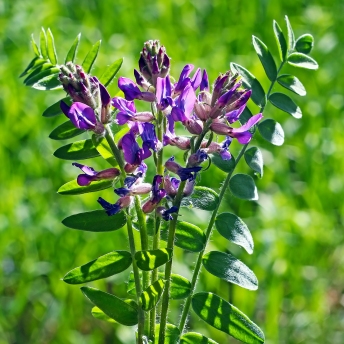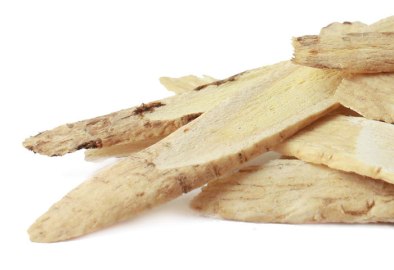Astragalus: One of the Key Ingredients to a Healthy Prostate
Astragalus Root Extract
(Astragalus membranaceus)
For over forty centuries, the antipathogenic, healing medicinal herb called astragalus has been caught our attention as a natural remedial tonic.

Astragalus (pictured) is a thorny shrub that can grow to approximately three feet in height. A native plant of Northern China and the provinces of Yunnan and Sichuan, it can also be found growing in Mongolia, Japan, and Korea. You will often see it flourish in open wooded areas, alongside the edges of forests or in the grasslands. Each branch can have anywhere from 8 to 12 pairs of leaves, although it is the root that is mainly used in medicines. This little member of the pea family is usually four or five years old when harvested, and it is thought that harvesting at the wrong times can be detrimental to the concentrations of active ingredients within. Among over 1750 species within the genus, Astragalus membranaceus is most commonly utilized, although we may also hear of A. trigonus and A. gummifera on occasion.
A staple of Traditional Chinese Medicine (TCM), it is a sweet and warming herb that is said to help the lung, spleen and heart. If you’re prone to viral infections or have slow healing wounds, decreased appetite, fever, uterine prolapse/bleeding, edema, muscle pain, diabetes, and uterine, ovarian, or colon cancers, this plant can be your godsend. TCM tonics will often include astragalus in combination with ginseng, angelica, or licorice. Nowadays it is recommended for weak immune systems, fatigue, or general health management.

For those of you who crack under stress, astragalus can be your tool to adapt to stress. If you’re fatigued, you can get back your energy, and if your body is having trouble fighting infections, these roots can boost your immune system. Astragalus also has antioxidant effects. This herb has a wide range of benefits, so I hope this post encourages you to look more into adding it to your diet.
The Main Components in Astragalus
The components that make Astragalus such an incredible a health boosting plant are saponins, flavonoids and polysaccharides, among others.
The astragalus root is the part that contains saponins, which can help you urinate, prevent inflammation, reduce hypertension, lower cholesterol, and overall boost the immune system.
And fun fact, Astragalus contains about 22 flavones, which provide health benefits via cell signaling. These flavones also demonstrate antioxidative qualities and can help prevent heart disease, cancer, and immunodeficiency viruses.
 Investigations about natural remedies have recently been taking root. Speaking of roots, the dried root of Astragalus membranaceus, one of the most popular health-promoting herbal medicines, has been used historically to treat the common cold, diarrhea, fatigue, and anorexia for more than twenty centuries. Experiments have discovered that the polysaccharide in the root of A. membranaceus are linked to benefits such as immunomodulation, antioxidant, antitumor, anti-diabetes, antiviral, hepatoprotection, anti-inflammation, anti-atherosclerosis, hematopoiesis, and neuroprotection.
Investigations about natural remedies have recently been taking root. Speaking of roots, the dried root of Astragalus membranaceus, one of the most popular health-promoting herbal medicines, has been used historically to treat the common cold, diarrhea, fatigue, and anorexia for more than twenty centuries. Experiments have discovered that the polysaccharide in the root of A. membranaceus are linked to benefits such as immunomodulation, antioxidant, antitumor, anti-diabetes, antiviral, hepatoprotection, anti-inflammation, anti-atherosclerosis, hematopoiesis, and neuroprotection.The Health Benefits of Astragalus
 Here is a brief list to break down more potential benefits from consuming astragalus:
Here is a brief list to break down more potential benefits from consuming astragalus:1. Support the prostate and relieve prostate symptoms in conjunction with soybeans
2. Enhance the immune system and offer protection against the cold and the flu
3. Excellent anti-inflammatory properties
4. Excellent antioxidant action
5. May provide kidney support
6. May provide anti-aging effects
7. Heal wounds and reduce scarring
8. May alleviate symptoms associated with chemotherapy
With such a wide range of benefits, why wait any longer to tap into the power of astragalus?
No comments:
Post a Comment